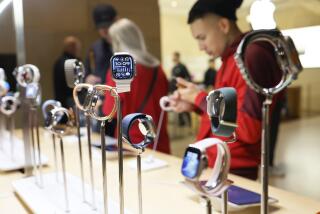Pebble smartwatch maker calls it quits, proving that being first doesn’t guarantee success
- Share via
Reporting from San Francisco — When smartwatch maker Pebble Technology Corp. went up against Apple and Google last year, industry insiders described it as a battle between David and Goliath.
On Wednesday, David lost.
Pebble, one of the first companies to manufacture smartwatches, announced on its website that it would shut down and sell its software and intellectual property to Fitbit Inc., which also plans to hire some of Pebble’s “key personnel.”
“Due to various factors, Pebble is no longer able to operate as an independent entity,” Pebble founder Eric Migicovsky said in a blog post published Wednesday on the Redwood City, Calif., company’s website. “We have made the tough decision to shut down the company and no longer manufacture Pebble devices.”
Migicovsky did not explain why Pebble could no longer operate independently, and the company did not immediately respond to a request for comment.
Fitbit, the publicly traded fitness tracker firm, confirmed it will snap up Pebble’s “key personnel and intellectual property related to software and firmware development,” but the acquisition excludes hardware.
The San Francisco company wouldn’t disclose the terms of the deal because “the acquisition is not material to Fitbit’s financials,” a Fitbit spokeswoman said in an email.
Analysts say the acquisition of Pebble’s software and engineers will bolster Fitbit’s own efforts to compete in the wearables market. Smartwatches like the Apple Watch, which now double as fitness trackers, have also eaten into Fitbit’s market share. The fitness tracker company’s growth has hit a wall in recent months, with lagging sales and expansion difficulties.
The company lowered its financial forecast for the current financial year in November, which sent its stock plummeting some 30%, to $8.51 a share. The stock is yet to recover, closing at $7.97 on Wednesday.
Fitbit’s spokeswoman declined to specify how many Pebble employees would be joining Fitbit, but confirmed that the “majority of Pebble employees in the software engineering function, as well as select employees in other functions,” would join the company.
Pebble is believed to have a little over 100 employees. The company laid off 40 employees in March, which constituted roughly 25% of its workforce at the time.
For many in the technology industry, Pebble’s sale and shutdown seemed inevitable after heavyweight firms such as Apple Inc. and Alphabet Inc.’s Google threw their hats into the smartwatch ring.
Despite offering the first smartwatch that enabled users to receive phone notifications and send and receive text messages from their wrist and change their digital watch faces using software, Pebble was dealt a blow when Google released Android Wear in 2014 and Apple launched the Apple Watch last year.
The company helped put smartwatches on the tech radar in 2012 when it launched a Kickstarter campaign to fund the development of the first Pebble watch. The campaign raised more than $10 million in 30 days, making it one of the most successful Kickstarter fundraisers at the time.
The company attracted a loyal following of early adopters, but it struggled to crack the mainstream market.
“They were competing against behemoths,” said Daniel Matte, an analyst who covers wearables for research firm Canalys. “They did everything they could to flesh out the platform and its features, but once Apple shipped the Apple Watch, it became a very difficult game to play.”
Aside from having a fraction of Apple’s and Google’s resources, Pebble couldn’t compete with firms that not only built smartwatches, but also owned the smartphone ecosystem.
Most smartwatches — Pebble included — connect to smartphones. With the Apple Watch tied to the iPhone’s iOS operating system, and Google’s Android Wear tied to Android devices, “that kind of tight integration excludes competition,” Matte said.
Apple has been the largest vendor of smartwatches this year, with sales of the Apple Watch Series 1 and 2 accounting for 2.8 million, or 45.6%, of smartwatches sold in the third quarter of 2016, according to data Canalys compiled.
Pebble, in comparison, came in fifth, selling only 130,000 watches in the same quarter, which accounted for 2.2% of smartwatch sales.
Matte noted that although the smartwatch and wearables industry has steadily grown, it hasn’t taken off in the way tablets and smartphones did following the launch of the iPhone and iPad.
For companies such as Apple, Google and Samsung, smartwatch sales have been but a blip on their earnings radar, with Apple still drawing the vast majority of its revenue and profit from iPhone sales, Google from search advertising, and Samsung from its range of phones and home consumer electronics.
Pebble, a start-up that only made smartwatches, didn’t have that benefit and, according to analysts, it wasn’t enough for the company to claim a minuscule slice of an already small category.
“Pebble had first-mover advantage, but what they lost sight of was they needed to build a relevant ecosystem,” said Patrick Moorhead, principal analyst at Moor Insights and Strategy. “They did not, and they didn’t add enough incremental value to overcome the lack of a robust ecosystem.”
As part of the shutdown announced Wednesday, Pebble will stop selling and promoting its line of smartwatches. Pebble watches already out in the world will continue to work “as normal,” but “functionality or service quality may be reduced in the future,” Migicovsky said.
Those who helped fund the watch on Kickstarter who have not yet received their backer rewards — perks given in exchange for financial support — will receive full refunds, the company said.
Despite its failure, Matte said Pebble should be remembered for releasing the first real smartwatch and creating a product category.
“They punched well above their weight,” Matte said. “The long-term opportunity just wasn’t there.”
Twitter: @traceylien
ALSO
Parents, put the phone down — after you read this
Soylent CEO still hasn’t removed remnants of shipping-container home, prosecutor says
Instagram is the latest social media firm to tweak its app in an attempt to prevent harassment
UPDATES:
2:50 p.m.: This article was updated throughout with additional details and comments.
This article was originally published at 10 a.m.







